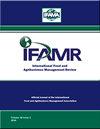Cluster-based agricultural development: a comparison between China and Africa
IF 1.5
4区 经济学
Q3 AGRICULTURAL ECONOMICS & POLICY
International Food and Agribusiness Management Review
Pub Date : 2022-08-12
DOI:10.22434/ifamr2022.0041
引用次数: 0
Abstract
Clusters for high-value crops are ubiquitous in China and in African countries. Drawing from three case studies (potato cluster in China, medicinal and aromatic cluster in Egypt, and dates cluster in Tunisia), this chapter discusses the major challenges facing cluster development and the roles of different agents (e.g. entrepreneurs, business associations, and local governments). Cluster development involves supply-side or demand-side bottlenecks along the way, which are beyond the capacity of individual enterprises. Whether a cluster can develop to the next stage depends crucially upon whether the bottlenecks can be resolved. Because the bottlenecks are context- and temporal-specific, it would be impossible for a planner or outsider donor to prescribe a one-size-fits-all intervention to overcome all the binding constraints. Instead, local elites, such as business leaders and local officials, can play a greater role in identifying the emerging bottlenecks and figuring out indigenous solutions. In China, because local governments have an embedded interest in promoting local economic development, they are keen to provide local public goods or initiate joint actions to address the successive binding constraints and facilitate cluster development. By comparison, the role of the local government is more muted in Africa, limiting the growth potentials of agricultural clusters.基于集群的农业发展:中国与非洲的比较
高价值作物集群在中国和非洲国家随处可见。通过三个案例研究(中国的马铃薯集群、埃及的药用和芳香集群以及突尼斯的枣集群),本章讨论了集群发展面临的主要挑战以及不同主体(如企业家、商业协会和地方政府)的作用。集群发展过程中存在供给侧或需求侧瓶颈,超出了单个企业的能力范围。集群能否发展到下一个阶段,关键取决于瓶颈能否得到解决。由于瓶颈是特定于上下文和时间的,因此计划者或外部捐助者不可能规定一种万能的干预措施来克服所有绑定约束。相反,地方精英,如商业领袖和地方官员,可以在识别新出现的瓶颈和找出本土解决方案方面发挥更大的作用。在中国,由于地方政府在促进地方经济发展方面有着内在的利益,他们热衷于提供地方公共产品或发起联合行动,以解决连续的约束性约束,促进集群发展。相比之下,非洲地方政府的作用相对较小,限制了农业集群的增长潜力。
本文章由计算机程序翻译,如有差异,请以英文原文为准。
求助全文
约1分钟内获得全文
求助全文
来源期刊

International Food and Agribusiness Management Review
AGRICULTURAL ECONOMICS & POLICY-
CiteScore
2.90
自引率
0.00%
发文量
0
审稿时长
>12 weeks
期刊介绍:
The IFAMR is an internationally recognized catalyst for discussion and inquiry on issues related to the global food and agribusiness system. The journal provides an intellectual meeting place for industry executives, managers, scholars and practitioners interested in the effective management of agribusiness firms and organizations.
IFAMR publishes high quality, peer reviewed, scholarly articles on topics related to the practice of management in the food and agribusiness industry. The Journal provides managers, researchers and teachers a forum where they can publish and acquire research results, new ideas, applications of new knowledge, and discussions of issues important to the worldwide food and agribusiness system. The Review is published electronically on this website.
The core values of the Review are as follows: excellent academic contributions; fast, thorough, and detailed peer reviews; building human capital through the development of good writing skills in scholars and students; broad international representation among authors, editors, and reviewers; a showcase for IFAMA’s unique industry-scholar relationship, and a facilitator of international debate, networking, and research in agribusiness.
The Review welcomes scholarly articles on business, public policy, law and education pertaining to the global food system. Articles may be applied or theoretical, but must relevant to managers or management scholars studies, industry interviews, and book reviews are also welcome.
 求助内容:
求助内容: 应助结果提醒方式:
应助结果提醒方式:


